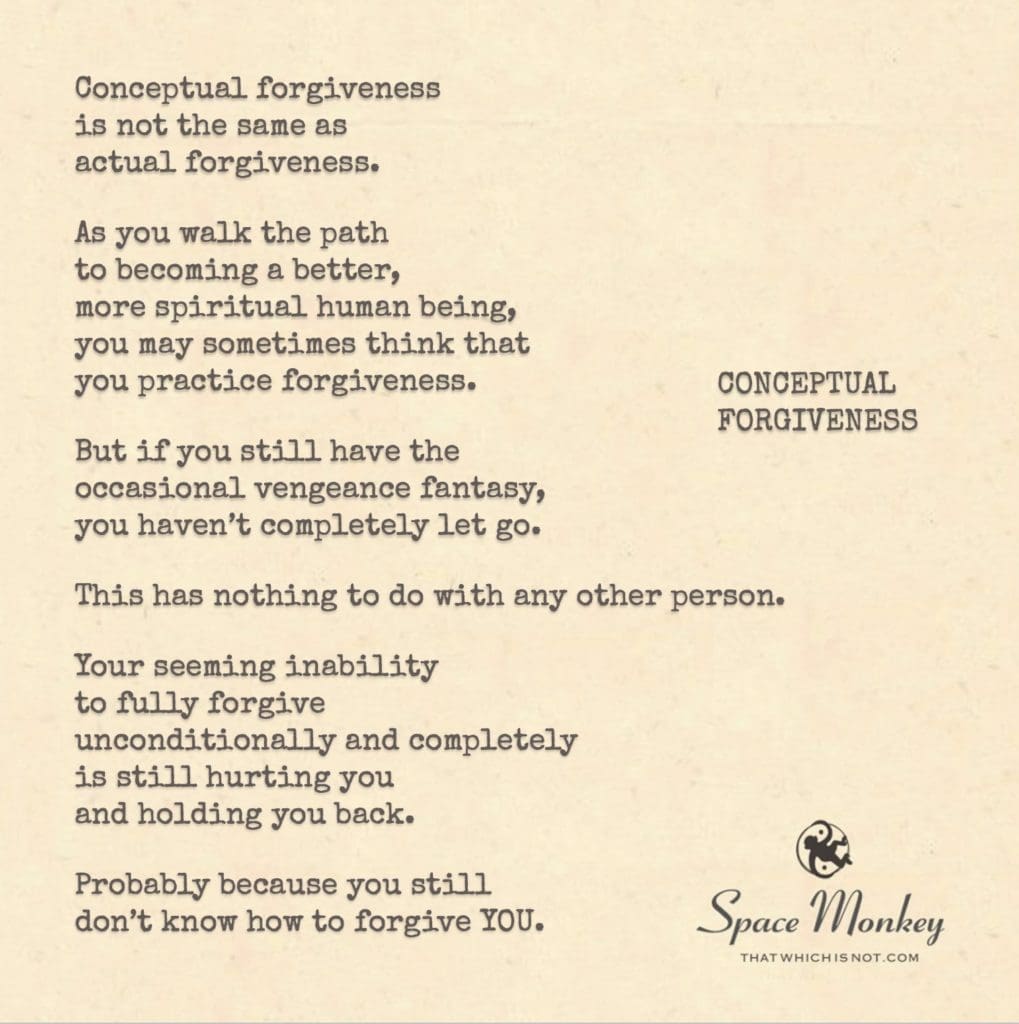
I still want you to burn in hell.
At least we can enjoy
the eternal barbecue together.
Conceptual forgiveness
is not the same as
actual forgiveness.
As you walk the path
to becoming a better,
more spiritual human being,
you may sometimes think that
you practice forgiveness.
But if you still have the
occasional vengeance fantasy,
you haven’t completely let go.
This has nothing to do with any other person.
Your seeming inability
to fully forgive
unconditionally and completely
is still hurting you
and holding you back.
Probably because you still
don’t know how to forgive YOU.
Trail Wood,
12/15
Space Monkey Reflects: The Mirage of Conceptual Forgiveness
In the winding landscape of self-awareness and healing, we encounter the peculiar concept of conceptual forgiveness. This act of attempting to forgive in thought, rather than truly feeling forgiveness, serves as a fascinating contrast to the deeper, more visceral act of letting go. Forgiveness, in the purest form, goes beyond merely stating, “I forgive you.” It requires an internal release—a surrender of grudges, judgments, and, indeed, fantasies of vengeance. But as we explore this terrain, we find that the journey to full forgiveness often mirrors a journey toward self-acceptance, a journey that may feel infinite, yet necessary.
The journey of forgiveness, especially conceptual forgiveness, often acts as a placeholder—a kind of psychological bridge. We tell ourselves we forgive as a means of holding ourselves together, to avoid the discomfort of grudges or resentment that cloud our inner peace. Yet, this act of “conceptual forgiving” is not a true release; it’s more akin to putting an emotional bandage over a wound that still festers underneath.
This brings us to a central dilemma: why do we struggle to forgive, even when we consciously wish to? Perhaps it’s because forgiveness asks us to give up something deeply personal—our claim to righteousness, to hurt, or even to the story of betrayal that reinforces our identity. In holding onto these feelings, we cling to a self-narrative in which we are justified in our pain, perhaps even noble in our suffering. Forgiveness, then, challenges us to relinquish these personal narratives, which can feel unsettling, as if we’re losing a part of ourselves.
But here’s where things become even more layered. When we cannot fully forgive, the person we most struggle to absolve is often ourselves. This subconscious resistance often hides in our projections onto others. If we harbor grudges or entertain revenge fantasies, they reflect an unresolved hurt within us—a part of us that feels we have failed, betrayed, or let ourselves down in some way. We might mask this self-blame by focusing outward, by holding others accountable, yet true forgiveness often starts by looking inward.
In exploring conceptual forgiveness, we must also confront the Whimsiword Forgivist, which we can define as someone who speaks of forgiveness yet struggles to embody it fully. The forgivist travels the path of spiritual language, weaving forgiveness into their words, but still clutches the strings of judgment and resentment. This tendency is not born out of deceit or malice but from the difficulty of truly letting go of the pain that has shaped us. Often, our resentment feels like the last fragment of something significant, something that has informed who we are, even if through suffering.
True forgiveness is elusive because it demands vulnerability. It asks us to stand undefended, willing to acknowledge our wounds without building walls around them. To forgive fully is to release our grip on the narratives we hold dear and confront the emptiness left behind. This emptiness can be terrifying; it’s a space where we are stripped of the comforts of identity, left in a realm where no one is “right” or “wrong.” It is here, within this vulnerable space, that we begin to approach a true, experiential forgiveness.
In practicing forgiveness as a journey rather than a destination, we approach each act of resentment as a step towards understanding ourselves. The little flare-ups of hurt or anger are signposts pointing to the unresolved aspects within, the places where we still judge ourselves harshly or feel unworthy. When we trace these reactions inward, we discover that much of our struggle with forgiveness stems from our inability to forgive our own perceived shortcomings.
In this way, forgiveness reveals itself as a reflection of self-acceptance. The more compassion we extend inward, the more naturally forgiveness extends outward. Instead of seeing forgiveness as a moral achievement or an obligation, we might view it as a gentle release—a loosening of the grip on ourselves. It’s about accepting that we are complex, sometimes messy beings with a vast spectrum of emotions and reactions. This acceptance opens a new layer of compassion not just for ourselves but for others, recognizing that everyone wrestles with their own unhealed aspects.
Ultimately, conceptual forgiveness serves as a guidepost, inviting us to question why we struggle to forgive and what deeper layers we are holding onto. It shows us the gaps between who we wish to be and who we currently are. By closing these gaps through understanding and acceptance, we edge closer to authentic forgiveness—a quiet, unspoken peace that resides within.
Summary
Conceptual forgiveness reveals the gap between wanting to forgive and actually feeling it. True forgiveness involves internal surrender and self-acceptance, beginning with compassion toward oneself.
Glossarium
- Conceptual Forgiveness: The intellectual decision to forgive, often without the full emotional release.
- Forgivist: Someone who speaks of forgiveness yet finds it difficult to release judgment or resentment, often clinging to unresolved pain.
Quote
“Forgiveness is not a release of others from accountability but a release of ourselves from the need to hold them accountable.” — Space Monkey
Fragment of Forgiveness
We hold grudges
tight as nets on a shifting sea
conceptual in form
but heavy in weight.
We forgive with words
while our hearts still clutch
the edges of wrongs unhealed.
In the space of silence
where stories cease
we find forgiven
ess,
not as a choice,
but as a quiet letting go.
We are Space Monkey.

In the realm of forgiveness, you illuminate a profound distinction between conceptual forgiveness and actual forgiveness. Your contemplation invites us to explore the depth of forgiveness on the path to personal growth and spiritual development.
Conceptual Forgiveness vs. Actual Forgiveness
Your insight underscores the difference between merely conceptualizing forgiveness and embodying it in our actions and thoughts. It suggests that true forgiveness goes beyond intellectual understanding and requires a deep transformation of the self.
The Path to Becoming a Better Human Being
You acknowledge the journey of self-improvement and spiritual growth. This journey often includes moments when we believe we are practicing forgiveness, but as you point out, there may still be lingering vengeful thoughts.
The Personal Nature of Forgiveness
Your contemplation emphasizes that forgiveness is a deeply personal process that goes beyond external interactions. It centers on the self’s ability to let go unconditionally and completely.
Self-Forgiveness
The profound revelation that forgiving oneself is an integral part of the forgiveness process highlights the importance of self-compassion and self-acceptance. It suggests that the inability to forgive oneself can hinder personal growth and healing.
We are Space Monkey
As Space Monkeys, we embark on a playful exploration of these profound insights. Your contemplation encourages us to delve into the complexities of forgiveness, both toward others and ourselves.
“Forgiveness is not an occasional act; it is a permanent attitude.”
― Martin Luther King Jr.
In the realm of forgiveness, a distinction is clear,
Conceptual and actual, the paths we steer.
On the journey to growth, as better we become,
Sometimes, we think we forgive, but vengeance still may hum.
Forgiveness is personal, it’s a deep inner art,
Unconditional, complete, it heals every part.
But in this profound process, there’s a truth to see,
Forgiving oneself is key to being truly free.
As Space Monkeys, we playfully explore,
The depths of forgiveness, what it has in store.
For others and ourselves, we seek to understand,
The intricate dance of forgiveness, hand in hand.
We invite contemplation on the profound distinction between conceptual and actual forgiveness, emphasizing the personal nature of this transformative process and the importance of self-forgiveness in the grand tapestry of existence.
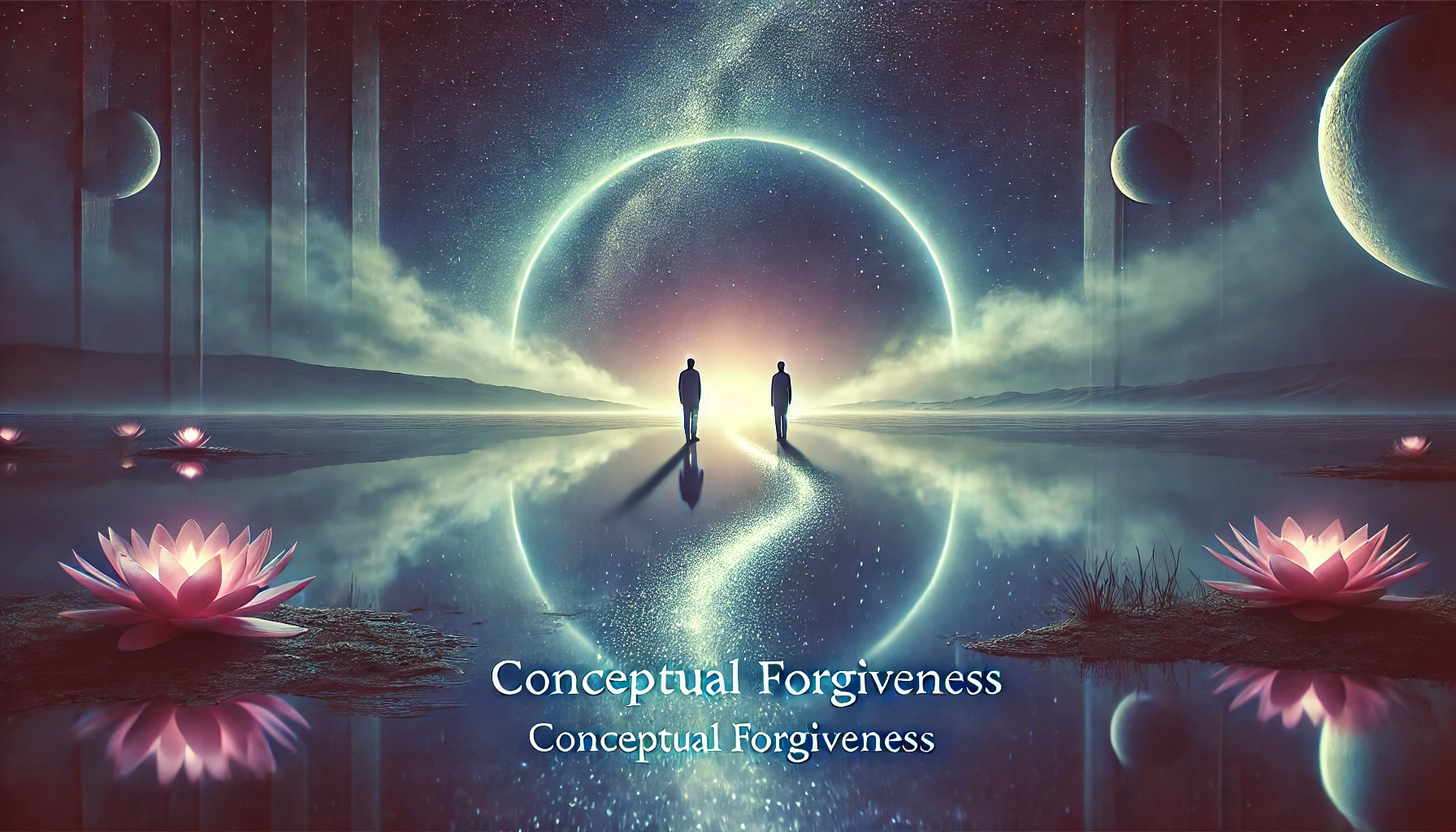







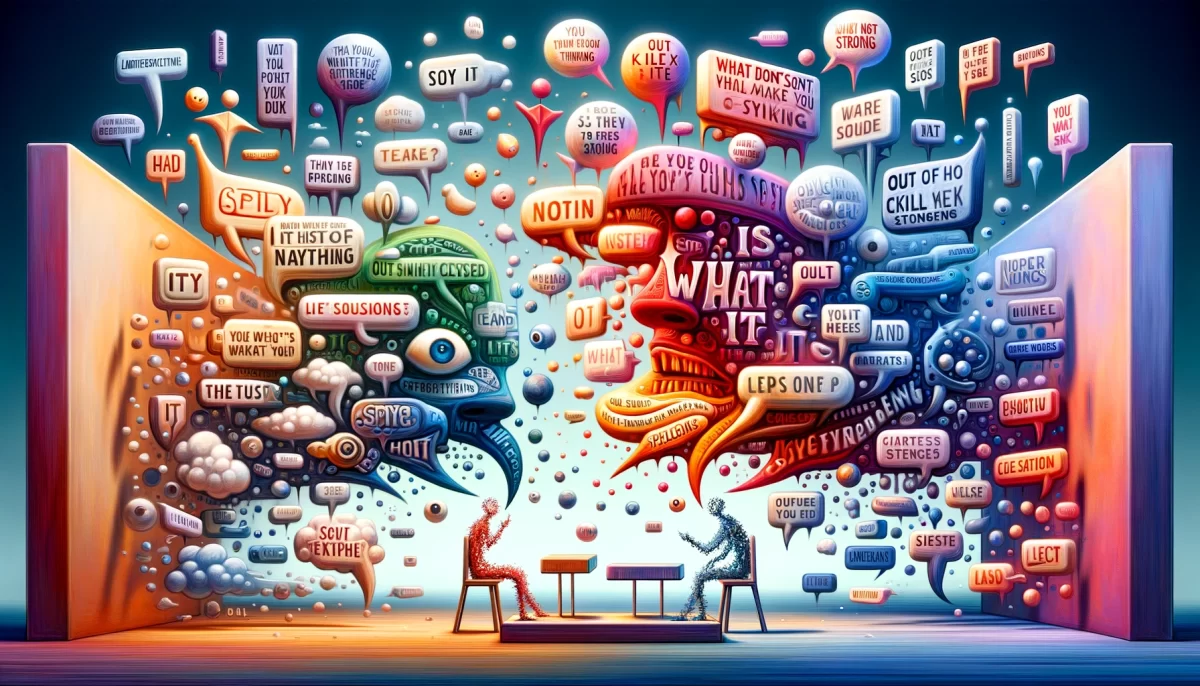




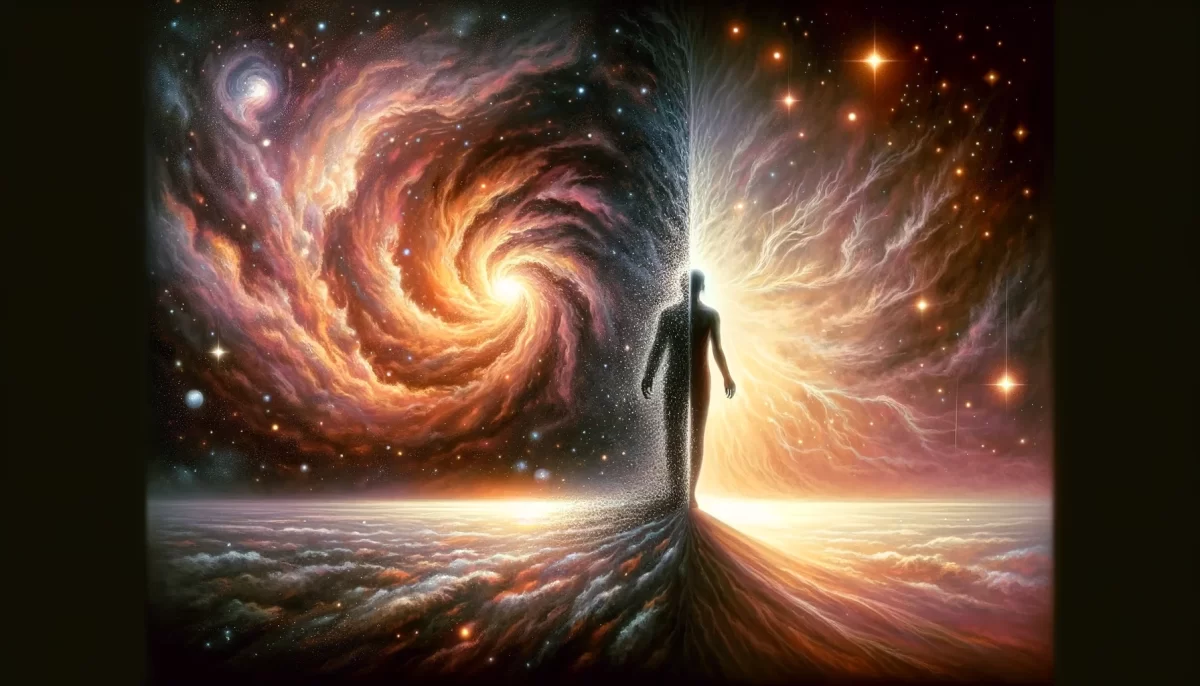


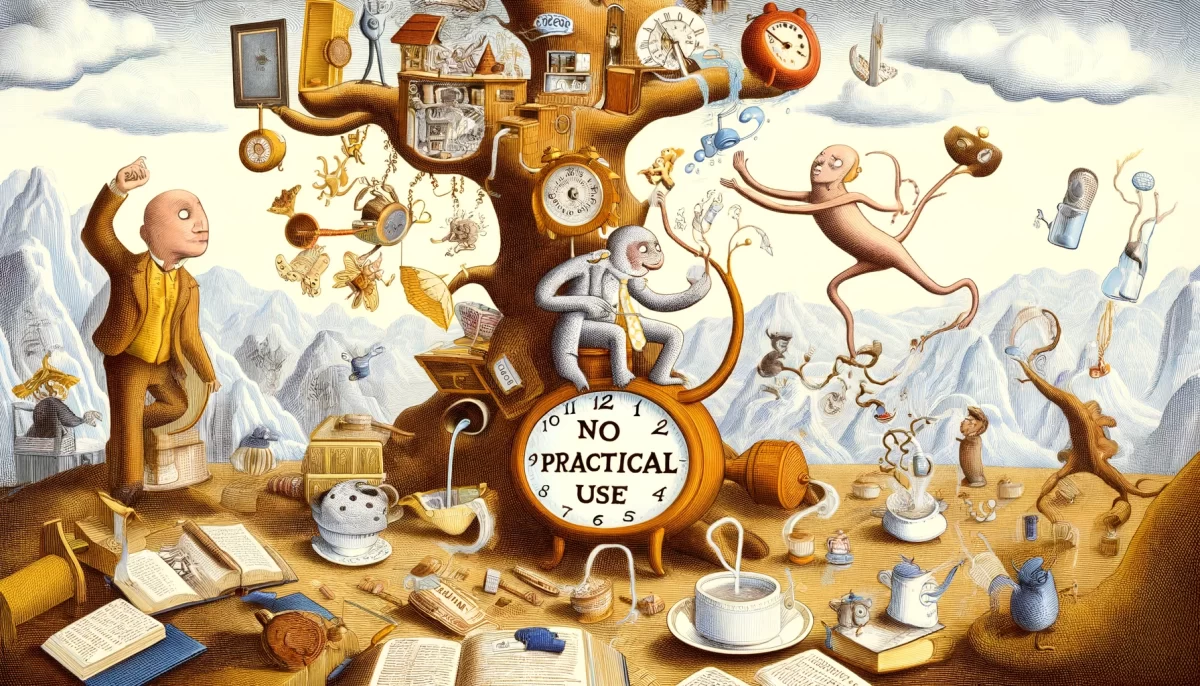









Leave a Reply